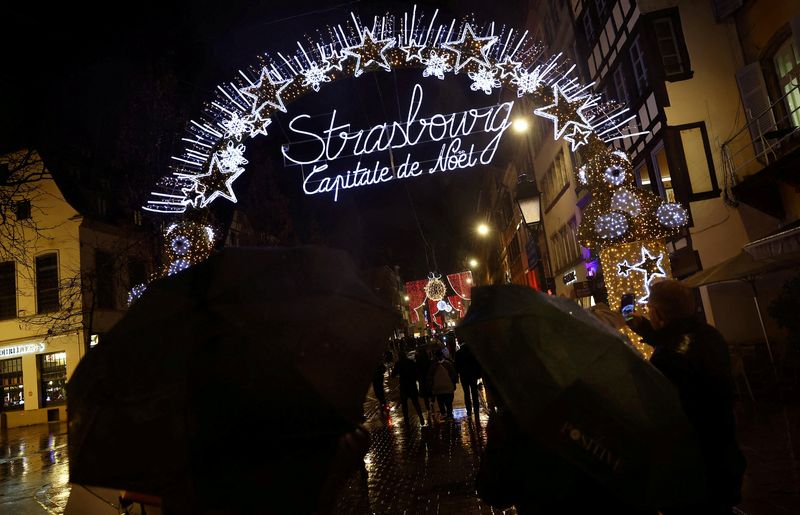By Leila Forud and Juliet Jabkhiro
PARIS (Reuters) – (This Dec. 23 story has been corrected to clarify that the Interior Ministry figures refer to the number of MICAS orders issued, not the people affected, in paragraph 9; and paragraphs 10 and 13 have been corrected accordingly)
The first time a Chechen refugee was told by French police that he was barred from leaving the northeastern city of Strasbourg and must check in with them daily, he didn’t think it was worth appealing the order.
He explained that France was engaged in a large-scale security operation for the Summer Olympics and did not think the authorities would listen to someone identified as a potential threat because of his association with people identified as “pro-jihadist”.
But when the Interior Ministry extended an order in late August to protect the famous Christmas market, which was the target of a deadly attack in 2018, the refugee, known to friends as Khaled, appealed to the city’s administrative court.
A panel of judges concluded that the measures were “disproportionate,” in an Oct. 3 decision seen by Reuters that he has no criminal record and was not under investigation for any crime.
While they maintained the ban on attending the Strasbourg Christmas market, they lifted other measures. But the ruling came too late for the 20-year-old to enroll in college, where he was due to start a cyber security course in September, according to evidence presented by his lawyer.
“I’ve lost my place. This year has been wasted,” Khaled told Reuters on condition of anonymity because he fears his academic and career aspirations will be derailed if it becomes known he is being monitored by the police. .
Friday’s deadly attack on a Christmas market in the German city of Magdeburg prompted a re-examination of security arrangements at seasonal markets in European countries.
But France’s interior ministry’s sweeping use of powers introduced under a 2017 anti-terrorism law to severely restrict the movement of people deemed a serious security threat had already drawn criticism from some lawyers and rights activists before the attack.
According to a parliamentary report released on December 11, at least 547 such orders were issued against people ahead of the Paris Olympics, although some, like Khaled, were never prosecuted.
Now, some lawyers and activists worry that the widespread use of these orders, known as “individual measure of administrative control and surveillance” or the French acronym MICAS, could become the norm for other major public measures.
The interior ministry, which is responsible for police, and local authorities in the Rhine region, which includes Strasbourg, did not respond to questions about the targets over the Christmas market.
Reuters has identified at least 12 cases, based on court documents, interviews with lawyers and one of the individuals involved. At least 10 had no terrorism-related convictions, although one person had previously been banned from the market. Reuters could not immediately confirm those details for the other two.
In the first five years after the Anti-Terrorism Act came into force on 1 November 2017, the number of MICAS orders issued for any reason from 1 November 2017 did not exceed seven in any 12-month period. Ministry of Internal Affairs to Parliament.
National courts have canceled or suspended at least 55 of the orders related to this year’s Olympics and Christmas markets, according to a December parliamentary report and a Reuters review of appeals filed with the Strasbourg court.
“The Olympics was a MICAS free-for-all, and now I get the impression that the Home Office is kind of lax about any event that draws hundreds of thousands of people,” said David Poincione, a lawyer representing the four people hit by the MICAS order. for the games, two of which went on to the Christmas market.
He is particularly concerned about cases involving people with terrorism convictions, saying: “It has become almost a tool of predictable justice.”
Ben Saul, the UN’s special rapporteur on terrorism and human rights, said France should use MICAS orders sparingly to “address a credible threat of terrorism where less intrusive means would not be sufficient”.
“Because they can be imposed without strong fair trial guarantees of criminal justice, there is a greater risk of abuse, arbitrariness or discrimination,” he told Reuters.
The Ministry of Internal Affairs does not comment. Former interior minister Gerald Darmanin said in July that the measures would only apply to people he described as “very dangerous” and potentially capable of carrying out attacks.
Stricter safety laws
The introduction of the MICAS orders was part of an ongoing tightening of France’s security laws over the past decade as President Emmanuel Macron’s government responded to deadly attacks and the growing political threat of the far-right.
Until recently, the measures were mainly used to monitor people after incarceration.
Reuters could not obtain last year’s data. But ex-prisoners accounted for 79% of the 136 MICAS orders issued by the end of October 2022, according to an unpublished Home Office report presented to parliament in 2023 and confirmed by two sources.
An intelligence source, who spoke on condition of anonymity because of security concerns, said in November that the MICAS orders had proven effective during the Olympics and authorities would take the same risk approach to those who might be prosecuted at the Christmas market.
A tradition that dates back to the Middle Ages, many cities host holiday markets with stalls offering gifts, decorations and treats such as pretzels and mulled wine.
It in Strasbourg is France’s oldest and largest, attracting around 3 million visitors last year.
In 2018, a gunman opened fire there, killing five people and injuring 11. The attacker was on a security watch list and pledged allegiance to Islamic State militants.
The suspect in the Magdeburg attack, which killed at least five people and injured dozens, is a 50-year-old psychiatrist from Saudi Arabia who has lived in Germany for nearly two decades.
The motive remains unclear. Investigators are looking into the suspect’s criticism of Saudi refugees in Germany, among other things. He also has a history of anti-Islamic rhetoric and has expressed support for the far-right Alternative for Germany (AfD) party on social media platform X.
Increase referrals
Since the French authorities expanded the use of MICAS orders, they have faced more successful court challenges.
As of November, judges across the country had overturned or suspended 50 MICAS orders related to the Olympics, about 9%, according to a parliamentary report. This was “often due to insufficient evidence of the threat” in the intelligence reports used to justify the measures, it said.
There have also been at least five successful appeals against measures issued for the Christmas market, according to Strasbourg court records.
According to a 2023 Home Office report, in the first five years after the introduction of MICAS orders, 13.1% of 1,203 orders were successfully appealed.
Nicolas Klauser, a legal scholar at France’s National Center for Scientific Research who studies MICAS cases, said the increase may be partly the result of increasing referrals, but the broadening of the profile of those targeted is likely an important factor.
They include people who may know someone with a terrorism-related conviction, or who have made statements about Israel’s war in Gaza that authorities describe as “apologies for terrorism,” but who themselves have no criminal records, Klauser said.
In Khaled’s case, intelligence reports reviewed by Reuters said he served time on charges of being associated with a group planning a terrorist act and “apologizing for terrorism” with another convict.
Khaled said they were people he knew from the neighborhood he grew up in or the gym he frequented, but he wasn’t close to any of them.
The reports also talk about relationships with other people described as “pro-jihadist”. Khaled said that these were mostly acquaintances of the neighbors. The three had been friends for some time, but they had not discussed violent extremism, he said.
Khaled is said to have told a friend that “a dirty trick was in the works and he would be genuinely excited.” Intelligence reports say the conversation took place on the eve of the 2020 killing of a French high school teacher who showed his students caricatures of the Prophet Muhammad in a free speech class.
Khaled denies this. It was about the wedding, he told Reuters, not the killing of Samuel Petty.
His lawyer, Lucy Simon, dismissed the alleged remark as “nonsense”, saying no evidence was provided in intelligence records and her client had not been charged in connection with the murder.
The Ministry of Internal Affairs does not comment. His representatives have said at hearings in other cases that details in the intelligence memos are deliberately obscured to protect sources.
Khaled said he was shocked and concerned when he learned from the news that the attack was carried out by a teenager of Chechen origin.

“It’s the community that will pay,” he remembers thinking.
On December 6, the Ministry of Internal Affairs extended the MICAS order for the third time. He has appealed and is awaiting the outcome.
